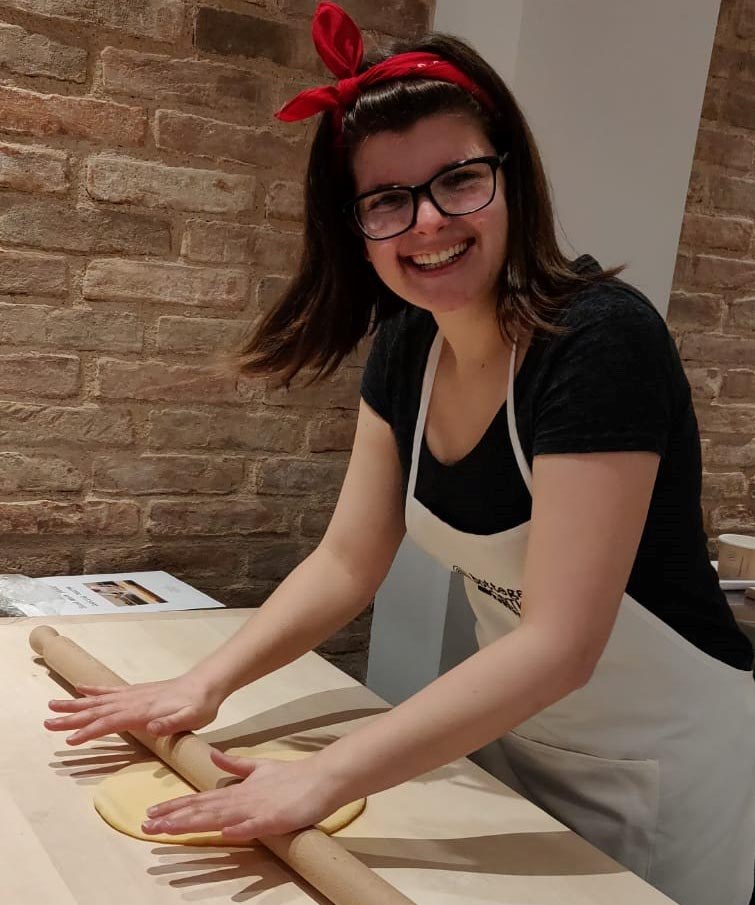Posted: May 23, 2019
“Time is an ingredient”

Me! In my happy place, rolling out pasta
I rushed around my apartment as I packed last minute for a trip I had been excited about since I started at Penn State. I was rushed and going into spring break in another country was going to leave a lot to do when I got back. What I found across the Atlantic was a sense of calm with the Alps to the North and an endless buffet of food to taste to the South. I thought with my Italian heritage I was ready for the amount of food Italy was going to throw at me but it was so much more. It was a food science major's dream: wineries, chocolate, pasta, gelato, meat, cheese and a whole culture built around what I am passionate about. With FDSC 460, we traveled throughout Northern Italy starting in Bologna, then Parma and west on to Torino. Each city boasted its own unique production facilities and standard dishes. However, of the three cities we traveled to, Parma sticks out, and not just because they had the best pizza I had ever tasted.
Parma is a relatively small town in comparison to the other two we lived in. Like many cities in Italy it has picturesque cobblestone streets in the Old City, a piazza to gather in and innumerable churches. Staying here was like being at home in another country. The people felt real, there weren't too many tourist shops and the food was to die for. While in Parma we visited a Parmigiano-Reggiano cheese producer. This cheese is unique because it is only produced in Parma. If you produce the same cheese but not using milk from the cows of the farms around Parma, it cannot be called Parmigiano-Reggiano cheese due to governmental protections of the process, ingredients and tradition of cheese makers. This is something outside the realm of American food production. The product front in American is constantly changing with new products, formulations and flavors. There is no time to stop and protect the tradition of making strawberry jam when there are a hundred other flavors to be tested.
Watching the cheese maker work is like watching a dance. He moves from one batch of milk to another checking with his bare hand the temperature and consistency of the curds. He is constantly feeling to make sure each vat of milk has the same heat treatment and creates the same product to be made into Parmigiano-Reggiano cheese. This takes time and requires him to get up early every day. Cheese makers do not get a day off. Milk comes every morning and by night there are thirty-two new wheels of cheese to age. These cheeses have to sit and dry before they can be brined for about a month. After the brining period the cheeses must wait and dry before they are evaluated by a cheese master who uses a small hammer to listen for the sound of a cheese that is ready to age. Once the cheese master approves the wheel, the cheese begins the two year aging process. Only after the wheel has spent two years drying and ripening can it be sold. This type of time is not found in the American food production system. We are constantly moving as quickly as we can to find the next flavor or process or ingredient. We do not take the time to let products develop and age and become what they are capable of. We do not take the time to train as extensively in our craft as these cheese makers and masters do. We have so much to learn in the way of time.
Food production in Italy has taught me so much about the value of craftsmanship. There is a love and passion for what the producers in Italy do. That is motivating to me to want to understand better the way we, as an American society, interact with food and time. This is a skill that I will take with me to whatever career I land. I want to develop a passion for the food I work with as much as the producers in Italy admire their craft. This work ethic is not cheap and I will have to put in the effort. Coming back from Italy I feel a responsibility to slow down. I am working to not rush around and feel a need to complete everything in one day. Each day I have work to do and I will get it done, just like the cheese makers. With the time I have I will work hard and be patient. For today I may produce something that I will not see the effects of for a week, a month or years. I will remind myself of the cheese and how good it was to taste the effects of time.
Ag Sciences Global
Address
106 Agricultural Administration BuildingUniversity Park, PA 16802
- Email globalag@psu.edu
- Office 814-863-0249
- Fax 814-865-3055
Ag Sciences Global
Address
106 Agricultural Administration BuildingUniversity Park, PA 16802
- Email globalag@psu.edu
- Office 814-863-0249
- Fax 814-865-3055

